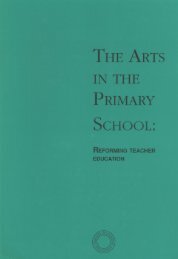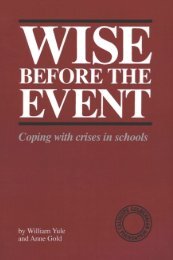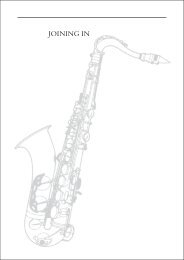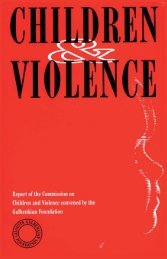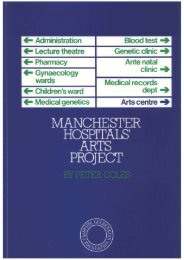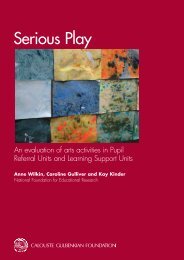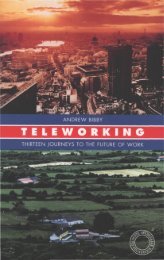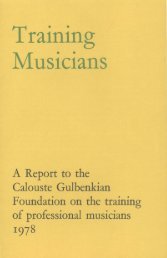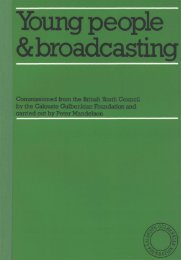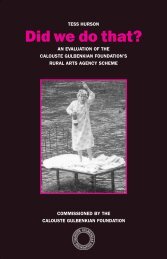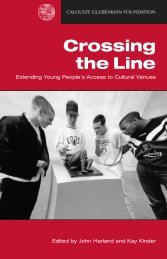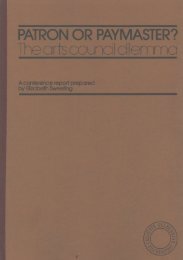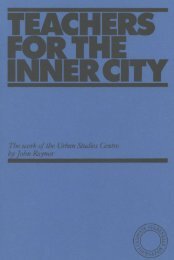The Arts in Schools - Calouste Gulbenkian Foundation
The Arts in Schools - Calouste Gulbenkian Foundation
The Arts in Schools - Calouste Gulbenkian Foundation
- No tags were found...
Create successful ePaper yourself
Turn your PDF publications into a flip-book with our unique Google optimized e-Paper software.
153 <strong>The</strong> Teachers are the most important resource <strong>in</strong> schools. It is onneed for their skills and professional judgement that the whole enter<strong>in</strong>-serviceprise is founded. If schools are to become more accountable,tra<strong>in</strong><strong>in</strong>g then effective patterns of assessment need to be developed.This means that provision for the dissem<strong>in</strong>ation of newapproaches and the scrut<strong>in</strong>y of exist<strong>in</strong>g ones must be madeavailable <strong>in</strong> the form of greater opportunities for <strong>in</strong>-servicetra<strong>in</strong><strong>in</strong>g <strong>in</strong> this critical area.154 <strong>The</strong> need We ma<strong>in</strong>ta<strong>in</strong> that the arts provide essential po<strong>in</strong>ts of entryfor<strong>in</strong>to understand<strong>in</strong>g and shap<strong>in</strong>g the worlds of feel<strong>in</strong>g andpartnership personal response and that <strong>in</strong> their practice and assessmentthe arts should provide an experience of positive achievement<strong>in</strong> schools. <strong>The</strong> task for assessment and evaluation <strong>in</strong>the future is to develop criteria for judgement about skill,understand<strong>in</strong>g and levels of achievement. We suggest thata these should be negotiated and agreed by teachers,pupils, school adm<strong>in</strong>istrators, with appropriate contributionsfrom external agenciesb <strong>in</strong> the field of exam<strong>in</strong>ations, there is a need to reviewmethods of choos<strong>in</strong>g and tra<strong>in</strong><strong>in</strong>g exam<strong>in</strong>ers, <strong>in</strong>clud<strong>in</strong>gspecialist exam<strong>in</strong>ers for the arts, and to devise bettermach<strong>in</strong>ery for consultation and feedback betweenteachers, schools and exam<strong>in</strong><strong>in</strong>g bodies<strong>The</strong> task is, and rema<strong>in</strong>s, to respond positively to the callfor accountability. <strong>The</strong> evidence of enhancement and achievementthrough the arts is <strong>in</strong> rich supply. We need formsthrough which to make it visible and the determ<strong>in</strong>ationthat it should not be distorted by demands for the wrongsort of 'proof.155 Summary In this chapter we have discussed and endorsed the need foraccountability <strong>in</strong> schools. We have called for more thoroughand responsive patterns of assessment and evaluation toachieve this and described the pr<strong>in</strong>ciples on which thesemight be based. We have drawn attention to exist<strong>in</strong>g schemeswhich are pursu<strong>in</strong>g such pr<strong>in</strong>ciples. We have considered thegeneral arguments for exam<strong>in</strong>ations <strong>in</strong> the arts and we haveput counter-arguments. We have identified a limited case forarts exam<strong>in</strong>ations and have po<strong>in</strong>ted to some of the anomalies<strong>in</strong> current approaches. A new approach to exam<strong>in</strong>ations wasdescribed and we have urged the need for further researchhere. We have highlighted the need for more contact andliaison between primary, secondary and tertiary educationand see the k<strong>in</strong>ds of evaluation patterns we have describedas play<strong>in</strong>g a key role <strong>in</strong> this. F<strong>in</strong>ally we have called for93



